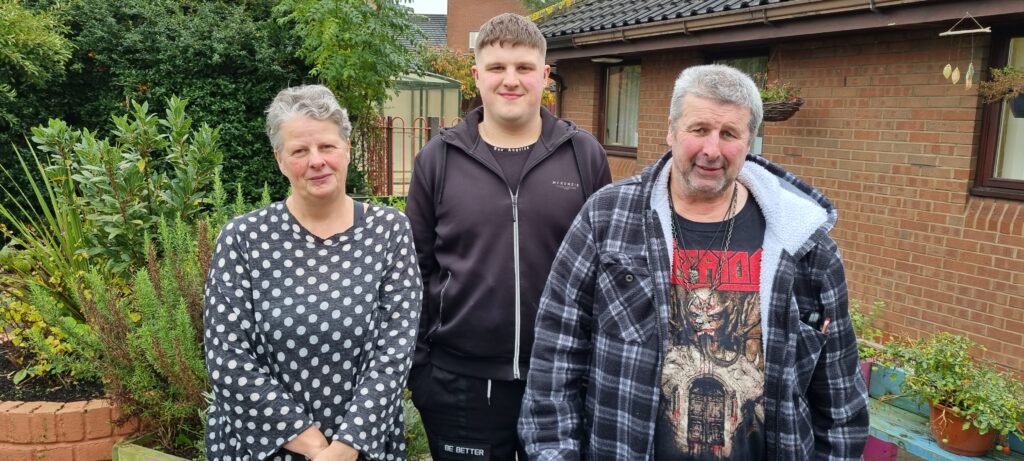Early onset dementia Case Study: Janine, Jack and Bob
Bob was serving in the army and stationed in Germany when he met Janine in the late eighties. When they got together, he left the army and started long distance lorry driving for a living.
Janine started noticing a change in Bob about six years ago. He lost a driving job because he was caught “white lining” – losing concentration while driving and hitting the white lines on the motorway. A string of other jobs followed but Bob found it increasingly hard to keep them because he was becoming more and more forgetful, resulting in him failing to turn up or making mistakes. Meanwhile Janine noticed a change in his behaviour, as he became more verbally aggressive and more withdrawn.

Janine, Jack and Bob at Young Dementia Leeds Hub
After a long process trying to get his condition taken seriously, Bob received a dementia diagnosis in 2020, just as the Covid lockdowns got underway. Bob went from working away from home for six days at a time, to being at home permanently. Bob needs constant supervision and so Janine and her two children, including her youngest Jack (now aged 20), started to care for him day in and day out.
Jack, now 20, has finished studying public services and wants to join the police force. Having to be a young carer for his dad has meant Jack sacrificing some of his studies. “I’ve had to alter my college life around to help out,” he says.
Luckily, the family were introduced to Young Dementia Leeds Hub which, says Janine, “has been a life saver. If it wasn’t for this place, Bob would be in a care home already.” Bob, 57, has been coming to the Young Dementia Leeds Hub for nearly three years now.
“Bob attends the Hub four days a week which allows me to do two long days at work,” explains Janine, 56, who works as a medical secretary. “Jack and I share all the caring between us. Other than that, we have to split the “Bobby sitting” between us, which is completely draining.”
Bob enjoys coming to the service and enjoys interacting with the other clients. The Hub offers a range of activities which are tailored to the clients who attend.
“He’s such a sociable person and so the chance to be around other people is really good for him rather than being stuck at home with me and the kids all the time,” says Janine. “The people at the Hub can’t do enough for you.”
Jack agrees that the Hub has been good for his dad: “He’s much calmer now since coming here.”
But the Hub only opens during the day and what Janine and her family really need, and struggle to find, is overnight accommodation for Bob. Wanting to go away and visit some family, it took Janine months of hard work to find a care home which would accommodate Bob overnight. Many care homes refuse people with early on-set dementia because they are too young.
“It’s almost impossible to get overnight care,” says Janine, “unless it’s a real emergency.”
She also points out that even care homes which accept younger clients prefer you to book for two weeks at a time, but she and family would like to be able to access overnight stays for shorter periods.
“Just a weekend would be good sometimes,” says Janine, “so we can get away or even just go out for a night.”
The paperwork involved in getting respite care is also very complex says Janine. “I’ve never claimed benefits or anything, and it’s so hard to know what you’re supposed to do and how.”
Both Janine and Jack are keen to be included in the study by Leeds Beckett University about the needs of early onset dementia patients and their carers. They have a lot to say on the matter, having struggled to access overnight care for Bob. Janine says: “I hope the study can help other people so they don’t have to go through the same problems we’ve been going through with Bob.”
They are also aware that Bob needs overnight support in an appropriate environment, where the people working care about his interests. “Basically we need the Young Dementia Leeds Hub, but where he is able to stay overnight as well,” says Janine. “Somewhere that will keep him active and offer a range of activities that are tailored to him. We need the hub with beds.”


